Top Trending Finance & Stock Market News & Highlights
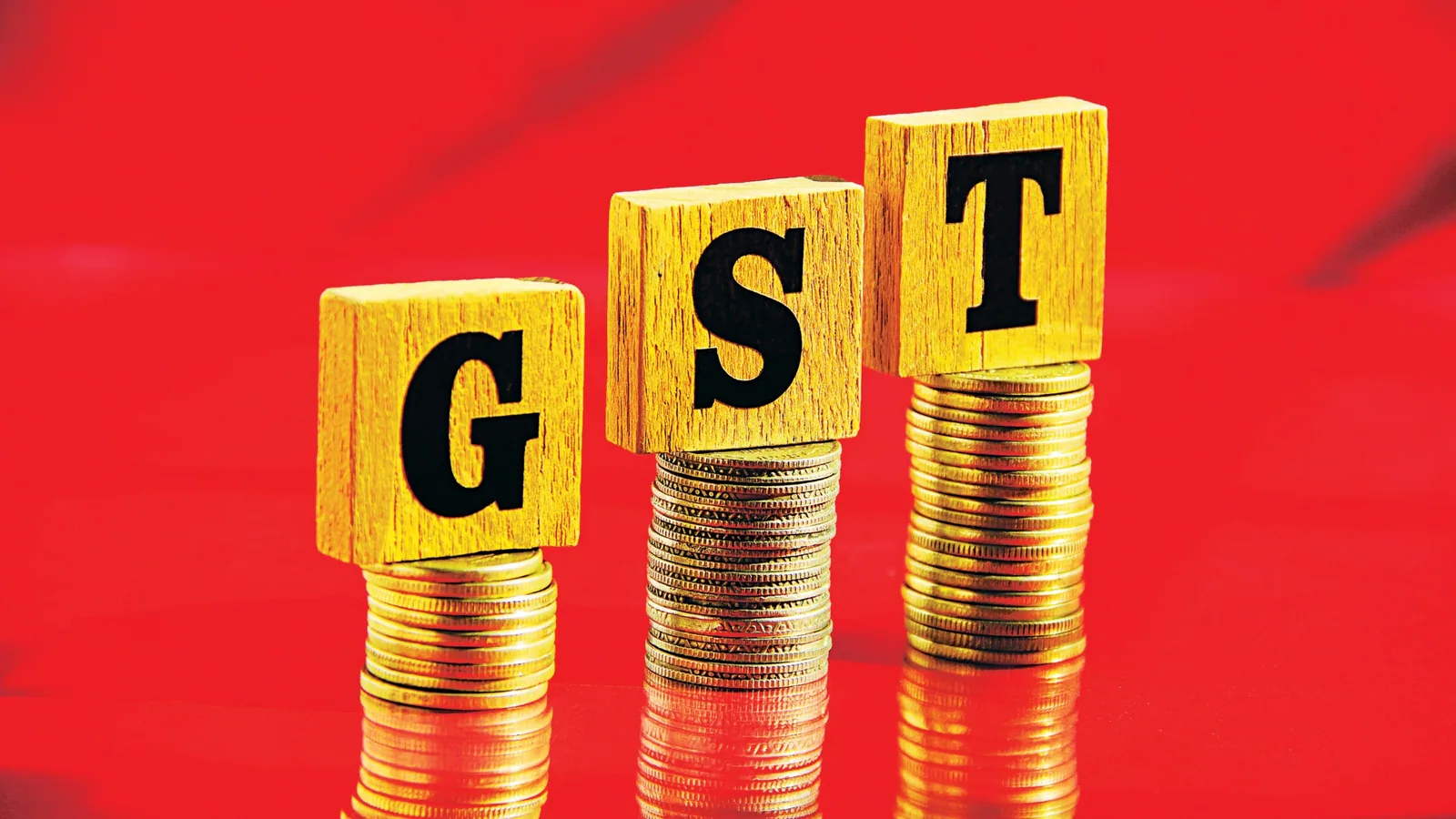

GST reform: starting Monday, these goods will be subject to the highest tax. View the complete list
September 22 GST changes: Under the new tax structure, which goes into effect on Monday, items falling within these categories will be subject to the newly revised highest tax rate of 40% GST. View the items' list here.After its 56th meeting on September 3, 2025, the GST Council, which is led by the Indian federal government, voted to streamline the indirect tax system in India by redesigning the current goods and service tax (GST) slab structure into a "two-tier" system.Indian customers will benefit from a revamped "two-tier" tax structure that goes into effect on Monday, September 22, 2025. Depending on the type of commodity sold in the country, it will be subject to either the 5% or 18% tax band. In India, GST is now imposed in four slabs: 5%, 12%, 18%, and 28%. However, the government has since modified these slabs. Many products sold in the Indian economy will see price reductions as a result of the federal government's action; nevertheless, starting Monday, a wide range of products will also be subject to higher consumer taxes. 1. Sin Goods: Generally speaking, sin goods are things that are detrimental to society and health, such as cigarettes and pan masala. Cigarettes, pan masala, beedi, and other tobacco goods including chewing tobacco and gutka, as well as online gaming and gambling, would all be subject to a 40% GST tax starting on Monday, September 22, 2025. 2. Luxury cars: Four-wheelers with an internal combustion engine (ICE) capacity greater than 1,200cc and a length greater than four meters were also placed in a 40% tax level by the GST Council. In the past, the ex-showroom pricing of SUVs and MPVs, which are included in this group, was increased by 28% GST and 22% Cess. 3. Over 350cc two-wheelers: The GST Council raised the tax rate for two-wheelers with engines larger than 350cc from 28% GST and 3% Cess to 40%. Despite the removal of the Cess levy, two-wheelers with engines larger than 350cc will now be subject to a higher tax rate. 4. Soft drinks: The central government raised the GST rate from 28% to 40%, which will result in a price increase for soft drinks and other non-alcoholic beverages like Coca-Cola, Pepsi, Mountain Dew, Fanta, and flavor-infused waters. 5. Items that cost more when you're in the 18% tax bracket: Items that will be subject to GST at the higher 18% slab starting on Monday, September 22, 2025, include dining at restaurants, particularly those with air conditioning and premium outlets; consumer durables like refrigerators, washing machines, and air conditioners; beauty and grooming services at salons and spas; and high-end smartphones and imported devices.
Published 23 Sep 2025 01:19 PM
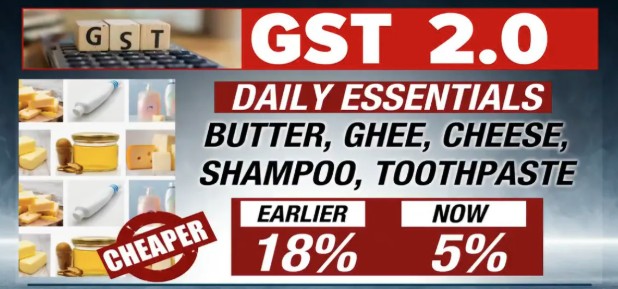

Live Updates on New GST Rates: When GST 2.0 goes into effect, food, cars, and televisions all get cheaper.
GST Reforms 2025 List: Goods and Services Tax (GST) reforms have become effective today, September 22, marking a historical shift in the country’s indirect taxation by merging four slabs into two (5% and 18%) and a special tax slab of 40% for “sin goods".The GST council, led by Finance Minister Nirmala Sitharaman, early in September announced a major overhaul in the indirect taxation system, aimed at simplifying the slabs, boosting the consumption and rationalizing the rates. Under the new plan, the government is set to merge the four slabs into two main categories with an additional “sin tax" bracket: 5% slab — for essential goods. 18% slab – for most other goods and services. 40% slab – for luxury and sin goods such as tobacco, alcohol, betting, and online gaming. This consolidation is expected to make tax compliance easier and also reduce prices on many items currently taxed at 12% or 28%.This consolidation is expected to make tax compliance easier and also reduce prices on many items currently taxed at 12% or 28%.Consumers will see essential items becoming cheaper from September 22, as several sectors from FMCG to Auto have announced earlier to pass on the benefits of lower GST to them.
Published 22 Sep 2025 05:13 PM
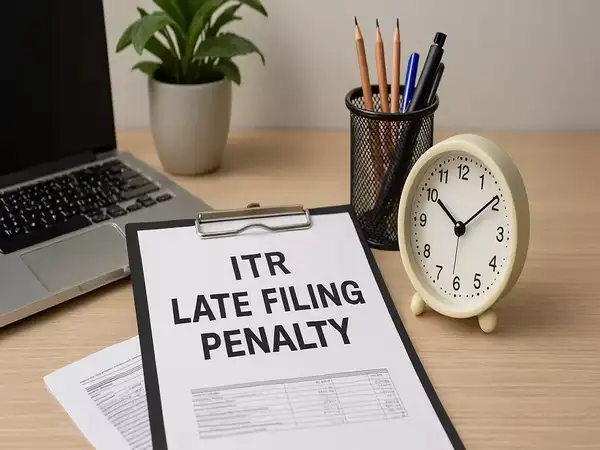

Live updates for the ITR due date: Will there be another extension of the income tax return deadline?
Date of ITR due REAL-time updates: The deadline for filing Income Tax Returns (ITR) for the assessment year 2025–2026 is now. Over 6.69 crore returns have already been received by the Income Tax Department, of which over 6.03 crore have been validated and 4 crore have been processed.Taxpayers who miss today's deadline risk interest on unpaid taxes, delayed refunds, and late fines of up to ₹5,000 (limited at ₹1,000 for individuals with incomes up to ₹5 lakh). Therefore, it is essential to file and confirm returns on time in order to prevent fines and guarantee prompt refund processing.The deadline is applicable to non-audit instances, such as the majority of salaried individuals, small enterprises or professions under the presumptive taxation plan, and Hindu Undivided Families (HUFs). It is recommended that taxpayers refrain from spreading false information about extensions and instead rely solely on official updates from Income Tax India.In order to assist last-minute filers in appropriately completing submissions, the department's helpdesk is open around-the-clock and provides assistance via phone, live chat, WebEx sessions, and social media.The department's help line is open around-the-clock, providing assistance via phone, live chat, WebEx sessions, and social media to help filers who are submitting at the last minute appropriately.
Published 15 Sep 2025 05:53 PM


Closing Bell: Sensex up 324 points, Nifty above 24,950; IT and PSU Banks rise, automobiles down
On September 10, Indian equities indices concluded well, with the Nifty closing above 24,950. The Nifty was up 104.5 points, or 0.42 percent, at 24,973.10 at the closing, while the Sensex was up 323.83 points, or 0.40 percent, at 81,425.15.We'll be returning tomorrow morning with all the most recent news and alerts as we wind up today's Moneycontrol live market blog. To view all of the global market activity, please visit https://www.moneycontrol.com/markets/global-indices.On Wednesday, markets gained almost half a percent, continuing their upward trajectory. Following a gap-up beginning, the Nifty index spent the first half of the day moving within a small range. However, volatility in the second half of the day reduced some gains, and it ultimately finished around 24,973 levels.With advances of more than 2.5 percent, the IT sector maintained its recovery, followed by the real estate, banking, and energy sectors. The auto industry, on the other hand, saw profit booking following multiple outperforming sessions, losing more than 1%. With the midcap and smallcap indices rising between 0.75% and 1%, market breadth stayed strong, supporting the bullish tone in both frontline and broader markets.Positive foreign capital market flows following a period of persistent depreciation, as well as increased confidence regarding the status of trade discussions between the US and India, helped to boost sentiment and maintain the upswing.Although the markets are slowly rising due to encouraging signals, the Nifty will need to maintain its participation from the two main industries—banking and IT—in order to progress toward the 25,250–25,400 range. Support has moved to the 24,650–24,750 level on the downside. In order to build up fundamentally sound counters across the board, we advise employing intermediate drops or consolidation phases while keeping a positive bias.
Published 10 Sep 2025 08:40 PM


Finance & Stock Market
Finance & Stock Market is financial management, which covers tasks including forecasting, budgeting, borrowing, lending, and investing. Finance can be broadly classified into three categories:
- Personal Finance
- Corporate Finance
- Public/government Finance
Lending, banking, investing, forecasting, and a wide range of other topics pertaining to the distribution and trade of financial assets are all included in the broad industry that is finance.
- NYSE - USA
- Nasdaq - USA
- Euronext - Netherlands
- Shanghai Stock Exchange - China
- Japan Exchange Group - Japan
- Shenzhen Stock Exchange - China
- Hong Kong Exchanges - Hong Kong
- National Stock Exchange of India - India
- LSE Group - UK
- Saudi Exchange - Saudi Arabia


Ram temple tourism: Hospitality, travel industries create up to 20,000 jobs in Ayodhya
A surge in tourist inflows has already increased demand for accommodation and travel, “leading to a significant upswing in Ayodhya’s hospitality sector, with a particular focus on the establishment of adequate infrastructure to host travellers”, he said. “At least 10,000 jobs and up to about 20,000 positions were created in various roles related to hospitality, travel and tourism – including hotel staff, cooks, servers, drivers, etc. in the last six months,” said Balasubramanian A, vice president and head - consumer & ecommerce at TeamLease. According to several officials in the hospitality sector, thousands of jobs in areas such as hospitality managers, restaurant and hotel staff, logistics managers, drivers, etc are likely to open up towards the end of this year or the first half of 2025 – not just in Ayodhya but in neighbouring cities like Lucknow, Kanpur, Gorakhpur, etc - with hotel companies and restaurant owners keeping a close eye on how the demand-supply situation pans out.“In the next three-four months, we should get a clearer picture of the everyday traffic at the temple and the demand for manpower to cater to the devotees,” an industry executive said on condition of anonymity. According to estimates, Tirupati Balaji Temple, which is among the world’s richest temples and remains crowded all year round, attracts an average 50,000 daily devotees in a steady state and the number goes up to 100,000 on festival days or holidays.According to various estimates, the Ram Temple in Ayodhya is likely to see traffic of between 300,000 to 700,000 people in the first week post inauguration.However, most of these jobs are temporary in nature and the count may go up or down, depending on how the demand pans out and the number of devotees that visit the temple, industry experts said. Typically, a hotel from construction stage to getting operational takes about 3-4 years, said Nandivardhan Jain, chief executive of Noesis Capital Advisors. Typically, a hotel from construction stage to getting operational takes about 3-4 years, said Nandivardhan Jain, chief executive of Noesis Capital Advisors. However, in the case of Ayodhya, various permissions could be fast-tracked and, so, the demand for manpower is expected to pour in within the next 18 to 24 months, he added.Hotel companies are watching how the demand-supply situation pans out. Currently Ayodhya is short in supply with only two big, branded hotels – Park Inn by Radisson and Cygnet.


Budget 2024: A pressing issue that may not wait till full budget
The fiscal deficit target of 5.3% will be set by the government in FY25, keeping in view the fiscal consolidation path till FY26, as it normalises capital spending and refrains from any major announcements in the interim budget before the general elections, Icra and Barclays economists have said. ICRA expects the fiscal deficit target for FY25 to be set at 5.3% of GDP, midway through the expected print of 6.0% for FY2024 and the medium-term target of sub-4.5% by FY26. India's Fast Moving Consumer Goods (FMCG) sector, which has 34% of its market in rural areas, is a good indicator of rural economic health. It is facing challenges in rural areas due to sluggish demand. The deficiency in rainfall in key agricultural states has disrupted the revival of rural demand seen in the first two quarters of the financial year. President of All India Consumer Products Distributors Federation, Dhairyashil Patil, has told TOI that FMCG sales in rural areas are 20-30% lower than usual. Demand for daily household products and groceries continued to be challenging in villages during October-December quarter, potentially hurting volume growth of the overall consumer goods sector. Godrej Consumer Products said demand trends in the fast-moving consumer sector during the third quarter were like the earlier quarter, while Marico said urban markets stayed steady but rural markets offered little cheer."High rural unemployment, along with demand for NREGS, reflects rural stress. El Nino derailed the initial green shoots seen at the start of FY24. Increased aggression of smaller players and alternative avenues of spending such as higher spends on education, medical, telecom charges, are leading to softer growth in the FMCG sector," Abneesh Roy, executive director at Nuvama Institutional Equities, has said. Consumer goods companies and analysts say demand for daily groceries and personal and home products in villages continued to trail urban growth in the December quarter but expect a steady recovery across markets on improving macro indicators, positive consumer sentiment and, importantly, increase in government spending in the election year.Another marker of rural distress is stiff demand for work under the Mahatma Gandhi National Rural Employment Guarantee Scheme. The budgetary outlay of Rs 60,000 crore for the shceme for fiscal 2024 was exhausted by November itself. The government subsequently provided Rs 10,000 crore in urgent assistance to meet demand.The FMCG companies have high hopes from election-year spending that will spur rural consumption. "During an election year, governments often extends benefits which are provided as part of various schemes, offer sops, helping rural households," said Akshay D'souza, chief of growth and insights at retail intelligence platform Bizom.


Tiger Woods Net Worth and Businesses—PGA, Nike, Gatorade, and a Mini Golf Chain
Golf legend Tiger Woods may have parted ways with Nike after 27 years, but he has made millions from his career as a pro golfer and lucrative endorsement deals with other major brands including Gatorade, Rolex, and Monster Energy. Considered one of the best golfers of all time, Woods is one of the few billionaire athletes in the world—and is only the second active athlete who is a billionaire, behind NBA star LeBron James. Woods has a net worth of $1.1 billion as of January 2024, according to Forbes.1 Here's how Tiger Woods built his fortune. In his 27-year career as a professional golfer, Woods accumulated 106 worldwide wins and 15 majors. He has 82 PGA Tour wins, tied with golfer Sam Snead for the most PGA Tour wins in history.Throughout his career as a pro golfer, Woods has earned about $1.8 billion, according to an estimate by Forbes.1 Woods has also earned a record-setting $121 million in prize money from PGA tours.3 PGA Tour. "Career Earnings."However, Woods' impressive earnings from golf are not the only way he amassed his wealth—in fact, they account for less than 10% of his net worth, according to Forbes. The rest of his fortune comes from major endorsement deals and a series of business ventures.Woods' 27-year partnership with Nike certainly contributed to his massive fortune as the sporting company was his biggest backer. Woods' deal with Nike was said to be worth about $500 million throughout the life of the contract. That's not the only major partnership Woods had, though. The golfer had a lucrative tie-up with sports drink company, Gatorade, which paid him an estimated $100 million over several years. However, the company ended its partnership with Woods in 2010 after news of several extramarital affairs surfaced. AT&T and technology consulting company Accenture were also among the brands that ended their partnerships with Woods at the time. Woods partnered with energy drink company, Monster Energy, in 2016 and has continued his endorsement deal with them. The pro golfer has been seen playing out of a Monster-branded golf bag and has also represented the brand's other drink, Monster Hydro Super Sport since 2022.Several of Woods' businesses have to do with golf—he owns a golf course design firm, TGR Design, golf simulator tool Full Swing, as well as an indoor mini golf chain, Popstroke. Popstroke has nine locations across Florida, Arizona, and Texas and anticipates opening an additional 15 sites in 2024 and 2025.Woods is also a shareholder in global real estate development company Nexus Luxury Collection, along with singer Justin Timberlake. In October 2023, the company announced that Woods and Timberlake will be opening a sports and entertainment gastropub in St. Andrews, Scotland, through Nexus. The premium venue includes dining and lounge areas, and Woods' own Full Swing golf simulators.Woods is no stranger to real estate and has bought and sold multiple million-dollar properties. His home on Jupiter Island costs an estimated $54 million.


New Worker Classification Rule Could Disrupt the US Gig Economy
Uber drivers and other gig economy workers could be legally classified as employees under a new Department of Labor rule that goes into effect in March. The new rule already faces at least one lawsuit, filed by freelance writers who want to remain "independent contractors" rather than employees. Employees are entitled to overtime pay, minimum wage, and other benefits not available to contractors.While people who work as contractors value the flexibility, employment law experts say there's no reason employers couldn't offer flexible hours alongside employee status and the benefits that go along with it. App-based ride-sharing services such as Uber (UBER) and Lyft (LYFT) earned the title of “disruptors” for the way they drove traditional cab companies out of business. Now, they’re trying to fend off the disruption that could be coming for them, in the form of a new federal labor rule. A new regulation on worker classification released this month is already facing at least one legal challenge, and will likely see more pushback from gig economy companies whose business model it threatens. The new law could turn the gig economy upside down, and affect many of the estimated 22.1 million Americans who work as independent contractors, employment experts say. Earlier this month, the Department of Labor released details on a rule setting standards on when a worker counts as an employee as opposed to an independent contractor, entitling them to overtime pay, unemployment insurance, and a slew of other benefits under the law. The new rule, first proposed in 2022, is set to go into effect in March.This week, a group of freelancers, including three New Jersey-based writers, sued the Department of Labor to overturn the new rule. At least one major business lobbying group is also considering legal action. Should the government give “employee” status to workers currently classified as contractors, it would threaten the business models of companies such as Uber, Lyft, and Doordash (DASH), whose contract workers cost their employers much less than traditional employees would.Uber and the Flex Association—a trade group representing gig economy companies—both released statements last week saying that the rule would have no immediate impact on their businesses. “This rule does not materially change the law under which we operate, and will not impact the classification of the over one million Americans who turn to Uber to earn money flexibly,” Uber’s statement reads.
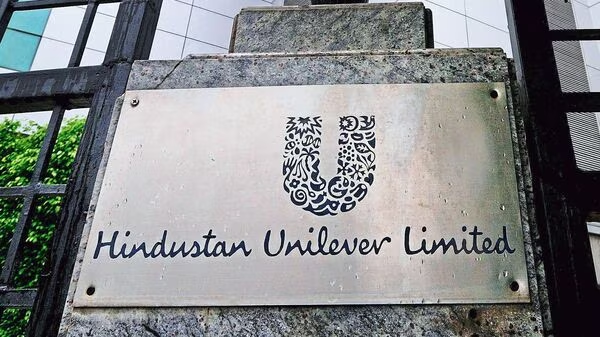

Price cuts mar HUL’s Q3 show, posts flat revenue and profit growth
Consumer goods major Hindustan Unilever posted a flat 0.5% growth in net profit to ₹2,519 crore in the December quarter from ₹2,505 crore in the corresponding quarter last year. Its volumes grew at 2% year on year in the quarter ending December. Its sales growth was flat, registering a marginal decline of 0.3% to ₹14,928 crore due to price cuts taken by the company. “Looking forward we expect gradual recovery in market demand to continue aided by increased government spending, recovery in winter crop sowing and better crop realization. Rural income growths and winter crop yields are key factors that will determine the pace of recovery,” said Rohit Jawa, CEO and MD of HUL. The company also expects competitive intensity to stay due to benign commodity prices. Going ahead, the company expects price growth to be marginally negative if commodity prices remain where they are.“HUL remains well positioned to unlock this opportunity whilst navigating the short-term challenges,” Jawa added. Its earnings before interest tax depreciation and amortization (EBIDTA) expanded by 10 basis points year on year to 23.7% in Q3. The FMCG major gets three-fourths of its business from home care and BPC business. Both these businesses saw mid-single digit growth in volumes. The company’s sales were affected due pricing action. Its home care’s revenues fell by 1%, with the BPC segment posting no change. “Skin cleansing revenue declined due to the impact of price reductions taken to pass on the benefits of lower commodity costs to consumers. Market development actions in body wash continue to yield good results. While delayed winter impacted skin care performance in the quarter, premium non-winter portfolios continued to do well,” said HUL in its press release.Food and refreshment business however saw a low-to single digit fall in volumes, as this segmental revenues went up by 1%. The company said that tea further strengthened value and volume market leadership, with green tea and flavoured tea performing well“Coffee grew in double-digits driven by pricing. Health Food Drinks delivered competitive modest price-led growth driven by Plus range,” HUL said.During the quarter, it launched Knorr Korean K-Pot noodles; and Bru Gold in Vanilla, Caramel and Hazelnut flavours.


Retail Retail’s net profit jumps 32% to ₹3,165 crore on festive fervour
Reliance Retail’s third quarter net profit grew 31.9% growth to ₹3,165 crore from ₹2,400 crore in the same quarter last year. Its revenue from operations also registered a 23.8% growth to ₹74,373 crore in the festive quarter, aided by aggressive store expansions. The Isha Ambani-led company added 252 stores during the quarter. On a YoY basis, its store count is higher by 1,549 to a total of 18,774 stores as of December 2023 end. “Reliance Retail has delivered strong performance during the festive quarter. Our business success is intricately woven into the larger fabric of India's economic growth, and together, we are shaping a compelling story of innovation and world class possibilities for the future,” said Isha M Ambani, executive director of Reliance Retail Ventures.Its footfalls grew by a robust 40.3%. Its digital and new commerce businesses now contribute to 19% of its revenue. “The retail segment has delivered an impressive financial performance with its rapidly expanding physical as well as digital footprint,” said Mukesh D Ambani, chairman and managing director, Reliance Industries.All its business segments exhibited double digit growth in the December quarter. Its mainstay grocery business grew by 41%. “Stores witnessed strong growth in non-food categories led by general merchandise & home and personal care. Catalogue expansion across home, cookware, furnishings and travel needs have enabled consumers in extending their shopping mission at Smart Bazaar as a one stop destination,” the company said.Its nascent consumer brands business also grew 3x aided by distribution reach. The company which re-launched Campa line of soft drinks said that its beverage, general merchandise and stapes are driving growth momentum of its own brands. It had also launched its staples business under the brand name Independence.It also launched new namkeens and sweets under Masti Oye! Brand, along with Deluxe assorted toffees under Toffeeman. The festival and wedding season also drove business in its fashion and lifestyle segments with good performance from its jewels business. “Tira is expanding its store network across top tier cities and has received strong customer traction. The business has delivered strong performance across various operating metrics including sales productivity, average bill value, repeats,” the company said.


2024 will be a perilous year for the world economy as geopolitical tensions ramp up, top economists warn
The year 2024 will likely be a stormy one for the global economy as growth slows and geopolitical tensions ramp up around the world, according to a World Economic Forum survey. The foundation polled over 60 chief economists ahead of its annual meeting, which is taking place in the Swiss ski resort town of Davos this week. More than half the respondents said the world economy will get weaker this year, and 70% predicted looser financial conditions – implying that they believe central banks, including the US Federal Reserve, will start lowering interest rates at some point in 2024. Over 80% of the economists surveyed by the WEF expect geopolitical tensions to drive up stock-market volatility and economic uncertainty, while around three-quarters of those polled said they're expecting artificial intelligence to boost innovation in advanced economies this year. "Amid accelerating divergence, the resilience of the global economy will continue to be tested in the year ahead," WEF managing director Saadia Zahidi said. "Though global inflation is easing, growth is stalling, financial conditions remain tight, global tensions are deepening and inequalities are rising." Wall Street executives have been fretting about heightened geopolitical volatility since war broke out in the Middle East in October, although those worries didn't stop stocks from charging higher over the final two months of 2023. Despite their gloomy outlooks, the Chicago Board Options Exchange's VIX index – a widely-followed Wall Street "fear gauge" – is trading close to its lowest level since before the pandemic, suggesting that traders aren't so worried.


India emerges strong amid global economic challenges, feels Citis Tyler Dickson
Tyler Dickson, head of investment banking at Citi feels that India stands out as a shining star in Asia in the midst of global macroeconomic challenges, The Economic Times reported. Dickson expressed bullish sentiments about India's mergers and acquisition (M&A) segment and equity market activities, during an interview with the paper.Questioned about his thoughts on how well India has fared amid the global macroeconomic challenges compared to other emerging markets in Asia, Dickson noted that the country is currently the fifth-largest economy globally and is poised to climb to the third position. The enthusiasm of Indian business leaders, coupled with the 'China plus one' strategy, makes India an attractive market for global investors, he said. Citi sees it as one of the best opportunities for both Indian and international clients, it reported. On the environment regarding M&As and tighter global liquidity conditions, Dickson felt that India's M&A market remains robust at around $85 billion despite global challenges. While the debt capital markets (DCM) face challenges due to fluctuating rates, Citi maintains a positive long-term perspective on the M&A landscape in India, he added. In terms of deal activity he feels that higher interest rates globally indicate slower economic growth and necessitate adjustments in deal activity. He however noted that stability in the cost of capital is crucial, and that as the market recalibrates, confidence will increase. The focus on quality in earnings, cash flow, and growth becomes more significant in a higher interest rate environment, he added. Further, Dickson also expressed a long-term bullish outlook on technology, considering it a fundamental driver of growth, the report said. While acknowledging the challenges faced during the "technology winter," Citi is cautiously optimistic about increased activity levels for technology companies in M&A, ECM, and DCM in 2024, he added. Acknowledging that there is a "financing wall in the 2025-2026 era", characterized by the need to refinance debt at higher costs, Dickson said Citi emphasises that this debt is not super expensive. The bank sees an opportunity for the global market to adjust to this reality, considering historical periods with more expensive debt, it said.
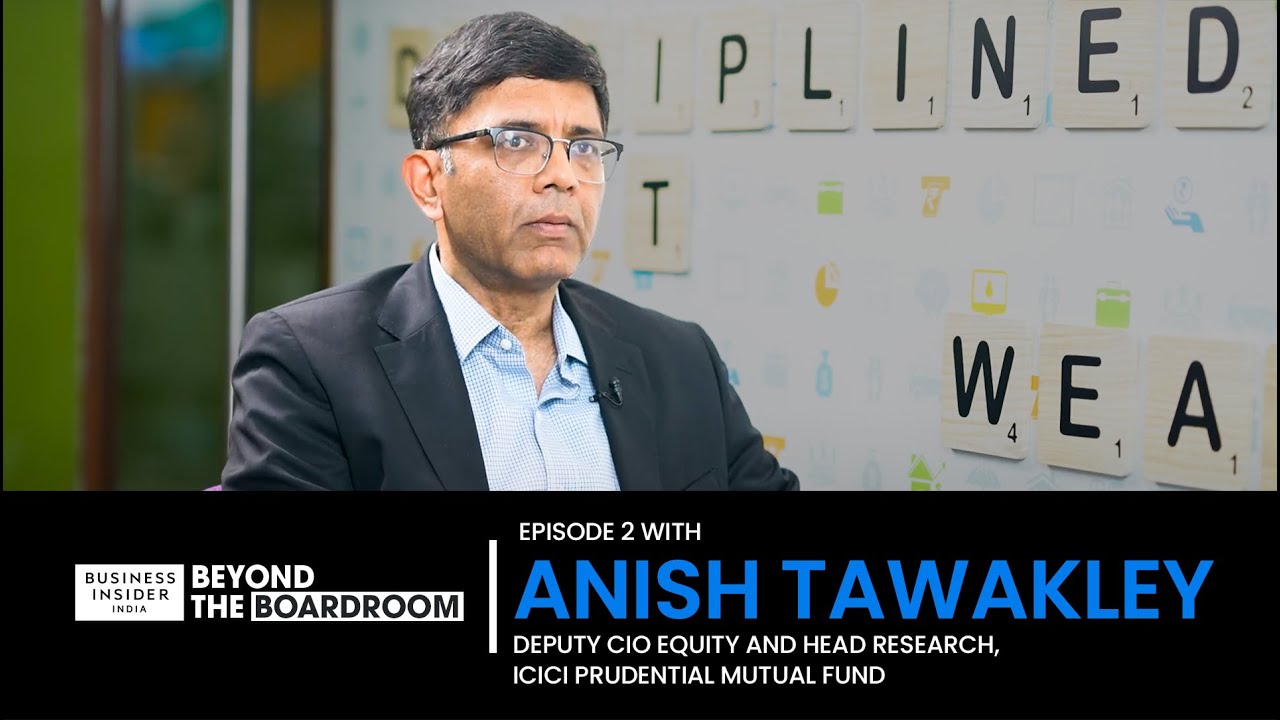

Fitch expects RBI to cut interest rates by 75 basis points in FY25
Mumbai, Federal Bank on Tuesday reported 23 per cent increase in consolidated net profit at Rs 1,035.42 crore for December quarter 2023-24, helped by a sharp decline in provisions and also surge in non-interest income. On a standalone basis, the private sector lender's net profit in the quarter increased 25 per cent to Rs 1,007 crore, its highest ever. The growth in the core NII was constrained because of narrowing of net interest margin at 3.19 per cent from the 3.55 per cent in the year-ago period, and the 18 per cent asset growth provided a limited succour. Chief executive and managing director Shyam Srinivasan said the bank has posted 19 per cent growth in deposits by giving higher rates, but was quick to add that the deposit growth is from individual clients which will yield dividends over a period of time. He admitted that the bank has not been able to deliver on its guidance of expanding NIMs in the second half of FY24 due to the challenging external environment where funds are coming at a higher cost, and added that it will look at maintaining NIM at the 3.20 per cent level in the near term. The net advances at the end of the December quarter stood at Rs 199,185 crore, 18% year-on-year (YoY) growth over Rs 168,173 crore in Q3FY23. In the previous quarter, the bank had reported net advances at Rs 192,817 crore.The retail book was up by 24% YoY in Q3Y24, while the business banking book registered an 18% YoY growth. The bank also reported a 23% YoY growth in gold loans.The deposits in the said quarter stood at Rs 239,591 crore and were up 19% versus Rs 201,408 crore in Q3FY23. On a quarter-on-quarter (QoQ) basis, the uptick was 3% against Rs 232,868 crore in Q2FY24.The bank reported a slight uptick in its gross non-performing assets (NPAs) in Q3FY24 at Rs 2.29% on a sequential basis against 2.26% in Q2FY24. However, GNPA was down YoY from 2.43% in Q3FY23. The net NPA was flat on a QoQ basis at 0.64% in Q3FY23. In the year-ago period, the lender had reported NNPA at 0.73%.The PCR improved by 189 bps YoY and 5 bps QoQ, while the collection efficiency ensured recoveries upgradations of Rs 290 crore, the company filing said. The PCR remains elevated at 11-quarter high.The returns on assets for Q3FY24 stood at 1.39% versus 1.36% in Q2FY24 and 1.33% in Q3FY23. The net interest margins (NIMs) were reported at 3.19%, down from 3.22% in Q2FY24 and 3.55% in Q3FY23.The bank reported its October-December quarter earnings during market hours and the share fell 0.55% to the day's low of Rs 152.10.Federal Bank posted strong growth in the branch network, adding 65 new branches in FY24.


Federal Bank Q3 consolidated profit jumps 23% to Rs 1,035 cr
Mumbai, Federal Bank on Tuesday reported 23 per cent increase in consolidated net profit at Rs 1,035.42 crore for December quarter 2023-24, helped by a sharp decline in provisions and also surge in non-interest income. On a standalone basis, the private sector lender's net profit in the quarter increased 25 per cent to Rs 1,007 crore, its highest ever. The growth in the core NII was constrained because of narrowing of net interest margin at 3.19 per cent from the 3.55 per cent in the year-ago period, and the 18 per cent asset growth provided a limited succour. Chief executive and managing director Shyam Srinivasan said the bank has posted 19 per cent growth in deposits by giving higher rates, but was quick to add that the deposit growth is from individual clients which will yield dividends over a period of time. He admitted that the bank has not been able to deliver on its guidance of expanding NIMs in the second half of FY24 due to the challenging external environment where funds are coming at a higher cost, and added that it will look at maintaining NIM at the 3.20 per cent level in the near term.The net advances at the end of the December quarter stood at Rs 199,185 crore, 18% year-on-year (YoY) growth over Rs 168,173 crore in Q3FY23. In the previous quarter, the bank had reported net advances at Rs 192,817 crore. The retail book was up by 24% YoY in Q3Y24, while the business banking book registered an 18% YoY growth. The bank also reported a 23% YoY growth in gold loans.The deposits in the said quarter stood at Rs 239,591 crore and were up 19% versus Rs 201,408 crore in Q3FY23. On a quarter-on-quarter (QoQ) basis, the uptick was 3% against Rs 232,868 crore in Q2FY24.The bank reported a slight uptick in its gross non-performing assets (NPAs) in Q3FY24 at Rs 2.29% on a sequential basis against 2.26% in Q2FY24. However, GNPA was down YoY from 2.43% in Q3FY23. The net NPA was flat on a QoQ basis at 0.64% in Q3FY23. In the year-ago period, the lender had reported NNPA at 0.73%.The PCR improved by 189 bps YoY and 5 bps QoQ, while the collection efficiency ensured recoveries upgradations of Rs 290 crore, the company filing said. The PCR remains elevated at 11-quarter high.The returns on assets for Q3FY24 stood at 1.39% versus 1.36% in Q2FY24 and 1.33% in Q3FY23. The net interest margins (NIMs) were reported at 3.19%, down from 3.22% in Q2FY24 and 3.55% in Q3FY23.The bank reported its October-December quarter earnings during market hours and the share fell 0.55% to the day's low of Rs 152.10.Federal Bank posted strong growth in the branch network, adding 65 new branches in FY24.
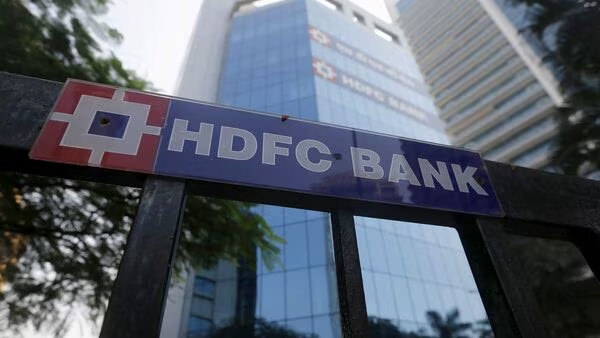

HDFC Bank Q3 consol net profit grows 2.6% sequentially to over ₹ 17,000 crore
Pre-provision operating profit (PPOP) came in at ₹23,650 crore which grew 4% sequentially.HDFC Bank’s third quarter consolidated net profit went up 2.6% sequentially to ₹17,257 crore from ₹16,811 crore in the second quarter of FY24. The year on year numbers are not comparable as HDFC Bank merged with HDFC as of July last year.The reading is better than what the street expected as most analysts predicted a marginal sequential drop in profits. Its total income went up by 6.9% to ₹1,15,015 crore as compared to ₹1,07,566 crore in the second quarter. On a standalone basis, its net interest income grew 3.9% to ₹28,470 crore from ₹27,385 crore in the September quarter. This was less than what the street was expecting. Provisions and contingencies for the quarter stood at ₹4,603 crore versus ₹3,311 crore in Q2. Gross non-performing assets (NPAs) saw an improvement sequentially as they stood at 1.26% of gross advances as compared to 1.34% as of September end. Net NPAs were at 0.34% of net advances for the third quarter.HDFC Bank’s third quarter consolidated net profit went up 2.6% sequentially to ₹17,257 crore from ₹16,811 crore in the second quarter of FY24. The year on year numbers are not comparable as HDFC Bank merged with HDFC as of July last year.The reading is better than what the street expected as most analysts predicted a marginal sequential drop in profits. Its total income went up by 6.9% to ₹1,15,015 crore as compared to ₹1,07,566 crore in the second quarter.Gross non-performing assets (NPAs) saw an improvement sequentially as they stood at 1.26% of gross advances as compared to 1.34% as of September end. Net NPAs were at 0.34% of net advances for the third quarter.Total deposits grew 27.7% while CASA deposits grew 9.5% on a year on year basis. Gross advances saw an increase of 62.4% YoY due to the effects of the merger. The balance sheet as of December 2023 stands at ₹34,82,600 crore.Nomura expected the bank to report a 6% sequential rise in net interest income and a 3% drop in profit after tax QoQ. Yearly growth is not comparable for the bank due to its merger with HDFC in July last year.Most banks are expected to see margin contraction, lack of treasury gains, and higher opex including staff cost and franchise cost in the third quarter. Emkay expects HDFC Bank’s net interest margins (NIMs) to recover from their lows seen in the second quarter.“HDFC reported strong credit revival of around 5% QoQ, but deposit growth has been lower of 2% QoQ, which we believe could be due to the unwinding of ICRR and should help the bank witness some margin recovery from the lows of Q2,” said Emkay.BoBCaps on the other hand expected its benefits from absorption of excess liquidity in the books likely to be offset by higher term deposit rates, leading to contraction in net interest margins.“Credit cost to remain stable. Expect minor YoY improvement in gross non-performing assets (GNPA) and net non-performing assets (NNPA) with controlled slippages,” BoBCaps said.
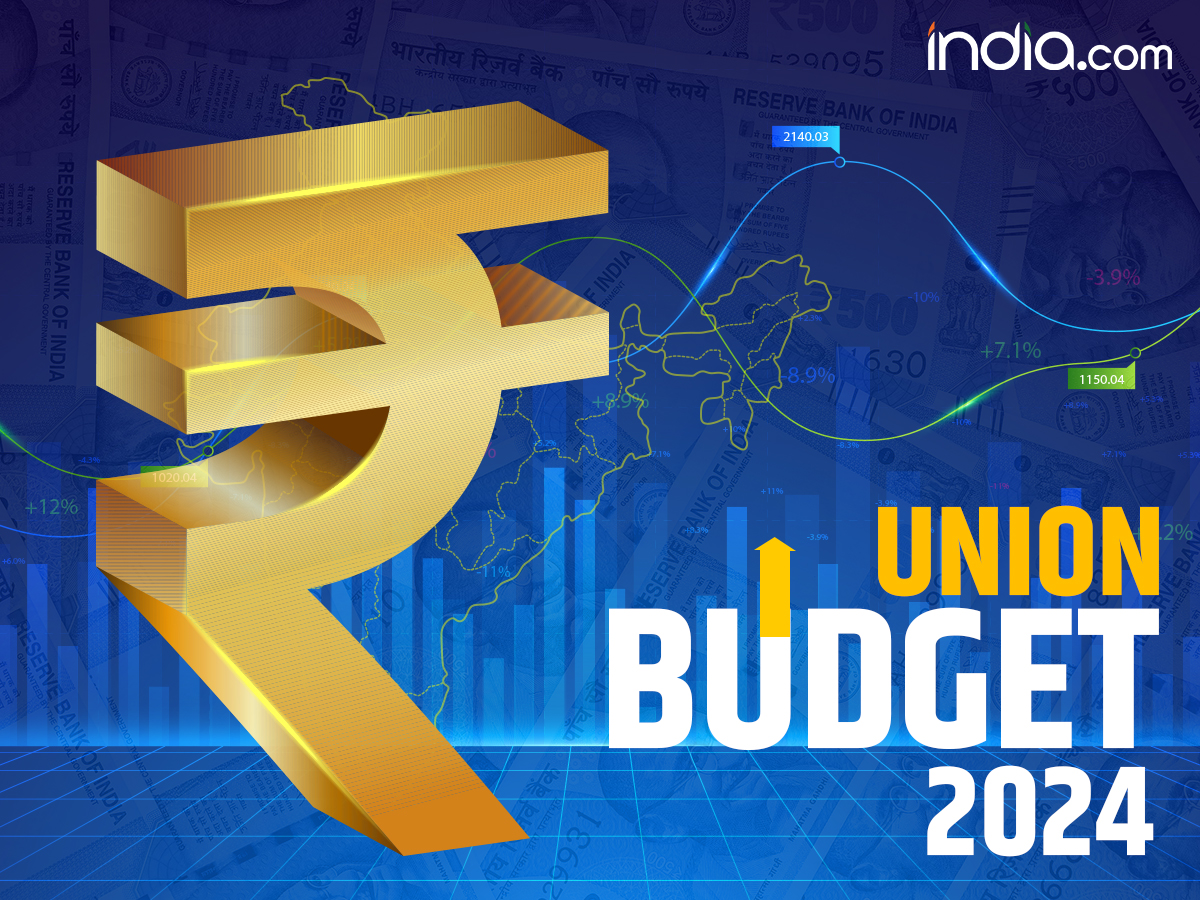

What the fintech industry hopes for the 2024 budget
A new BankBazaar.com article outlines the budget wish-list of the fintech sector, which includes getting all banks on board with the account aggregator structure, creating parity between digital and non-digital lenders, and treating unlisted equity at par with listed equity for long-term capital gains taxation.Expectations are high regarding certain favors being given to taxpayers and specific industries, even though India's finance minister Nirmala Sitharaman has stated that the upcoming Budget, which is scheduled to be presented on February 1, is only a vote-on-account (approving the continuation of existing programmes) and not a full-fledged Budget.BankBazaar.com has published a list of requests the fintech industry has made of the government in a report. While some of these requests may not be covered by the budget, they can be seen as a comprehensive list of what the fintech industry hopes to see in 2024.Account aggregator (AA) framework with fast tracking – The government introduced the AA framework in September 2021, which makes it possible for financial institutions like banks and insurance companies to securely share a person's data with that person when that person gives consent. The idea is that a person can electronically share their financial information with another financial institution rather than having to send paperwork to each one individually. The person must register with an AA, an organization under RBI regulation.The BankBazaar.com paper discusses getting as many bank accounts as possible integrated into this framework and bringing all banks—public and private—on board the AA system. According to the most recent data, a few banks are still not included in the AA framework, including City Union Bank, Dhanlaxmi Bank, RBL Bank, South Indian Bank, and others.It also discusses incorporating the Goods and Services Tax Identification Number, or GSTIN—a designation that in India identifies businesses that are registered for GST—into the AA framework. Once that occurs, it will open the door for small enterprises and retail consumers to obtain loans from many lenders in a purely digital manner.More documents have been added to DigiLocker. Additional documents including the EPFO passbook, ePAN, and form 26 AS (statement showing tax credit) should be added to DigiLocker, according to a BankBazaar.com article. Customers will benefit from easy access to their papers and the ability to share them with financial institutions for prompt credit disbursement.The Ministry of Electronics & IT introduced DigiLocker, a safe cloud-based platform for document exchange, archiving, and authentication. Using a smartphone or Aadhaar number, one can register for DigiLocker and then submit documents.Creating an even playing field for online and offline lenders The RBI released its rules for digital lending in September 2022, in response to the unscrupulous activities of illicit digital lending apps. The guidelines place the burden of proof on banks and NBFCs to make sure that, among other things, grievance redressal officers are engaged, loan-related costs are disclosed upfront, and digital lending apps and platforms do not misuse customer data. They also state that loan servicing occurs directly with the lender's (regulated entity) account and not the digital lending app or platform.According to the BankBazaar.com research, online and offline lending should be treated equally. This consumer-centric legislation that was put in place for the online lending sector must also be applied to the offline lending sector. According to the research, "the growth of the FinTech industry depends on the level playing field principle."Laws pertaining to the DPDP Act's implementation: The Digital Personal Data Protection Act, 2023 (DPDP Act) mandates that anyone in possession of data take appropriate precautions, obtain consent before using the data, and even face severe fines in the event that a data breach occurs. According to the DPDP Act, a "consent manager" is any third-party organization that is registered with the Data Protection Board and that gives people the ability to grant, monitor, and revoke consent for the use of their data by "data fiduciaries," such the government or a financial institution.


Groyyo Secures $5.4 Mn To Power MSMEs With Manufacturing Solutions
OVERVIEW - Established in July 2021, Groyyo provides manufacturing MSMEs in the fashion and leisure sectors with a centralised platform that enables them to grow and improve their business endeavours.The money will be utilised to strengthen Groyyo's cash reserves and support its strategic goals of revolutionising the manufacturing industry. Groyyo, a business-to-business manufacturing and supply chain enablement startup, has raised INR 40 Cr ($5.4 Mn) from Lighthouse Canton and Trifecta Capital as part of its debt fundraising round. business, which is based in Delhi NCR, plans to use the additional funding to increase its financial reserves and scale up its manufacturing-related strategic projects. Groyyo, which was founded in July 2021 by Subin Mitra, Pratik Tiwari, and Ridam Upadhyay, provides manufacturing micro, small, and medium-sized firms (MSMEs) in the fashion and lifestyle sectors with a centralised platform, enabling them to grow and improve their commercial endeavours. "The additional capital infusion will enable us to collaborate with a wider range of SMEs and support them in expanding their operations worldwide," stated Mitra. He continued by saying that the investment will help the business achieve its objective of enabling South Asian SMEs to expand internationally and digitalize their shop floor through in-house technological solutions. "This is also highly aligned with the Indian government's Made in India initiative, as we relentlessly strive to attract a growing amount of global demand to the subcontinent," he continued. Through an order management tool, the business hopes to offer entry-level technology to overlook small-scale industries in Delhi NCR. It states that it has over 360 factories working for more than 110 companies, generating a wide variety of goods in 150 different categories. Groyyo operates in India as well as the UAE, Bangladesh, Vietnam, and Turkey, which increases efficiency. Additionally, the business says it has reached international stores Inditex, Next, Mango, Ross, and Burlington.In order to expand the team throughout important demand belts in the US and the EU, as well as industrial clusters in Bangladesh and India, the business raised $40 million in debt and equity in its Series A fundraising round earlier in 2022.
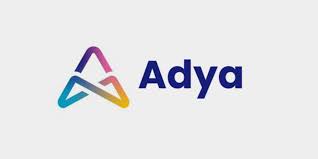

Adya.ai Secures Funding To Assist Businesses in Developing Apps for ONDC
The pre-series A investment round of Adya.ai, a startup providing digital commerce solutions, has raised Rs 10.5 crore from investors in Indian Angel Network (IAN) and other strategic investors.According to the company, IAN's investors contributed Rs 3.75 crore, with the remaining funds coming from other key investors.Adya.ai, a technology service partner, was founded in 2023 by Shayak Mazumder, CEO and CTO, Archana Mazumder, COO, and Angad Singh Ahluwalia, CBO. The company employs data science and artificial intelligence (AI) to assist businesses with digitizing. It also provides plug-and-play tech stacks as well as other ONDC integration solutions. Enterprise Tech Startup Adya.ai Secures Funding To Assist Businesses In Developing Apps On ONDC Indian Angel Network (IAN) led the pre-Series A funding round, which brought in INR 10.5 Cr ($1.2 Mn). 'Strategic' investors who wished to remain anonymous also participated in the round. IAN gave the startup INR 3.75 Cr. in funding. Digital commerce and technology solutions provider Adya.ai raised Rs 10.5 crore in a pre-Series A funding round, led by investors from Angel Network such as Uday Chatterjee, Romesh Sobti, Sri Prakash, and Hari Balasubramanian. Indian Angel Network (IAN) provided Rs 3.75 crore to this tranche, along with contributions from other key investors.Adya.ai released a news release stating that the firm plans to utilize the money to strengthen its market position, develop its innovative products, and accelerate the development of AI technology.Adya.ai, a SaaS-based solution for data security and ransomware prevention, was co-founded in 2023 by Angad Singh Ahluwalia, Shayak Mazumdar, and Archana Mazumdar. The answer to find a company's most sensitive data, protect it from undue exposure, and alert management in the event that it is stolen or exploited is said to involve big data and machine learning.According to the Bengaluru-based startup, their system also provides businesses with a dashboard where they can view the files and folders that any customer has access to just clicking on a user. The ONDC's technological service partner, Adya.ai, powers major sectors including retail, logistics, F&B, transportation, credit, insurance, and finance.Adya.ai asserts that its technology marketplace has allowed over ten major enterprise contracts, including partnerships with Canara Bank, Aditya Birla Financial Limited, Hindustan Unilever, and others. The company focuses on areas like CPG, financial services, retail, and mobility. The platform for seed and early-stage investments known as the IAN Group is made up of IAN Fund I, BioAngels, and the IAN Angel Group. With investments in 19 distinct industries, the sector-agnostic fund has helped innovative businesses in India and seven other nations.


Today's Stock Market: Sensex, Nifty Maintain Losses Into Day Three As HDFC Bank and Lindtree Continue to Drag
Sensex and Nifty Continue To Fall Into Day Three Closing Bell As HDFC Bank, LTIMindtree Drag Standardization Due to a decline in HDFC Bank and LTIMindtree shares following their December quarter results, Indian indices witnessed their third day of losing gains. The Nifty 50 and Sensex have both dropped by almost 3% over the past three days. The Sensex finished today at 71,186.86, down 313.90 points, or 0.44%, and the Nifty 50 closed at 21,465.25, down 106.70 points, or 0.49%. "The Index has formed a spinning top candlestick pattern which indicates a reversal of trend and to confirm the same, the Index needs to breach the hurdle of 21,530 while the immediate support is placed at today's low i.e. 21,285," said Aditya Gaggar, director of Progressive Securities.The index was dragged by Asian Paints Ltd., Titan Co Ltd., NTPC Ltd., HDFC Bank Ltd., and LTIMindtree Ltd. In the meantime, the index was positively impacted by Sun Pharmaceutical Industries Ltd, ICICI Bank Ltd, Reliance Industries Ltdz, Larsen & Toubro Ltd, and Axis Bank Ltd.


Nuvei acquired Paya for $1.3 billion
According to CEO Philip Fayer, Nuvei's acquisition of the Atlanta business will improve its standing in integrated payments, B2B, and international e-commerce. According to a news release released on Monday, Nuvei, a company that facilitates payment acceptance and provides payout choices, intends to integrate Paya's integrated payment capabilities into its global platform. Paya provides integrated payments across a range of verticals, including business-to-business, healthcare, nonprofit, and education. According to Nuvei CEO Philip Fayer, the acquisition will improve the company's standing in the international e-commerce, integrated payments, and business-to-business sectors. Based on information from the company's LinkedIn profile, Nuvei was established in 2003. According to the press announcement, Fayer stated that the inclusion of Paya "will accelerate our integrated payment strategy, diversify our business into key high-growth non-cyclical verticals with large addressable end markets and enhance the execution of our growth plan." According to the announcement, the deal is anticipated to be finished by the end of the first quarter. According to Nuvei, it intends to use a combination of cash, an already-existing credit facility, and a brand-new secured credit facility worth $600 million to finance the acquisition.


Deutsche Börse pays €3.9 billion to acquire SimCorp.
In the buyout deal, Deutsche Boerse acquires more than 90% of SimCorp's shares. The amount is an estimate, and by the end of the week, it hopes to release an official figure that will enable the deal to conclude within the next five working days. The combination of SimCorp's investment management software and Deutsche Boerse's data, which was revealed in April, has been hailed by the management of Deutsche Boerse as a critical component of the company's future strategy. Furthermore, Deutsche Börse has published a notice on the compulsory acquisition of the shares held by the remaining minority owners in SimCorp, in accordance with sections 70–72 of the Danish Companies Act. Deutsche Börse publicly requests that all surviving minority SimCorp owners transfer their SimCorp shares to Deutsche Börse within the mandatory acquisition notice period, which ends on October 30, 2023, at 23:59 (CEST) and lasts for four (4) weeks. Cash payment will be accepted for the mandatory purchase of SimCorp shares, which have a nominal value of DKK 1.00 and will be made at a cost of DKK 735 per share. The SimCorp Board of Directors has taken note of the fact that the mandatory purchase is being carried out at the same price per share (DKK 735) as the offer made to the shareholders. The Board of Directors cites its June 7, 2023, announcement about the Offer.


For $10.5 billion, Nasdaq buys Adenza.
Today, Nasdaq announced that it is spending $10.5 billion to buy Adenza, a business that creates regulatory software and risk-management tools for the financial services industry. According to a press release from the firm today, the megabucks acquisition, which consists of an equal portion of cash and stock, will increase Nasdaq's serviceable addressable market (SAM) to $34 billion, or $10 billion over its current level. Second only behind Qualtrics's $12.5 billion acquisition, which was disclosed a few months ago, is the deal, which ranks among the largest acquisitions of the year thus far. Adenza provides banks, insurance companies, broker-dealers, and other similar financial sector corporations with an end-to-end platform that covers everything from data administration to reporting and is accessible through cloud computing or on-premises installation. The company has two headquarters: one in New York and the other in London. Nasdaq, which runs three stock exchanges in the United States and seven in Europe, said it will be in a better position to offer “comprehensive support to financial institutions” in the areas of regulatory technology, compliance, and risk management now that it has taken Adenza under its wing. Financial institutions employ software tools sold by Adenza to make sure their operations adhere to regulatory requirements. The technologies can gather financial activity data from an organisation, look for indications of compliance problems, and present the data in a dashboard. The software developed by Adenza also simplifies associated duties, such making sure dashboard data is correct. The company also provides a different set of applications that facilitate trade execution for financial institutions. A platform that banks can use to get market data and buy shares is one of the software solutions offered by Adenza. Users are able to evaluate new investing strategies before putting them into practice by using a simulation tool.


















